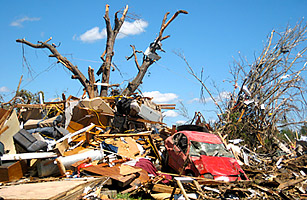
As the sky grew darker and the winds reached furious levels, my family and I huddled in our small laundry room, watching on my laptop a local television station broadcast images of the tornado bearing down on us. By way of a camera on top of the county courthouse, we saw the massive twister cut a path of destruction through the middle of Tuscaloosa, Ala. As I held our dog, Bama, and my wife, Amy, grabbed our 16-month-old son, John Harper, we could tell that the tornado was bearing down on us. Then the power went off and the Internet feed was gone. We could only hold on, listen and pray.
Our home and our lives were spared, but many in Tuscaloosa were not so lucky. Neighbors slowly filed outside their homes and saw downed tree limbs and debris scattered in their yards. From our vantage point we could not immediately see the havoc that the twister had wreaked, but we quickly learned what had happened. The F5 tornado cut a long swath through the heart of Tuscaloosa County at least a half mile wide on Wednesday afternoon, completely leveling buildings and tossing trees and power poles like toothpicks. As of 7 p.m. Thursday, officials had confirmed at least 36 deaths in Tuscaloosa and more than 600 injuries. Several other tornadoes tore through Alabama on Wednesday, killing at least 194 people in the state and leaving a million without power. A friend of ours lived in an apartment complex that was hit very hard. She rode out the storm inside her clothes dryer.
Forecasters had predicted a strong band of storms, giving the area a 90% chance of tornadic activity. This specific tornado had crept up on Tuscaloosa from the southwest, fortunately giving area residents plenty of time to seek shelter.
Nevertheless, a police substation, fire station and the local Emergency Management Agency were among the facilities demolished by the storm, making the response even more difficult. Most of the city was without power, and Tuscaloosa Mayor Walt Maddox urged citizens to conserve water in anticipation of shortages. “This is going to be a very long process,” Maddox said. “There will be areas of the city that will be hurting for a very long time.”
A large proportion of the destruction was student housing at the University of Alabama, which canceled final exams and pushed back graduation ceremonies from May to August. Meanwhile, two elementary schools were completely destroyed. A third — Holt Elementary School — suffered some damage but was still structurally sound, and because it was located near an area that suffered massive damage, it was used as a shelter and command post for the Tuscaloosa County Sheriff’s Office. Emergency responders continued to sift through rubble Thursday night in search of the living and the dead.
Jackie McLaurin sat on the track in front of the school eating lunch Thursday afternoon with her daughter Erica Simms. McLaurin was at her home in the nearby Pondering Meadow subdivision when the tornado approached. She huddled in her bathroom with two of her children to ride out the storm. “You could hear the windows breaking,” she said. “You could see the doors come off the hinges. I don’t want to go through anything like that again.”
Her home was destroyed around her, but McLaurin and her brood made it out of the rubble safely and quickly went to work helping others out of their demolished homes. The sounds of screams filled the air. “That was just indescribable,” McLaurin said, and she could not go on as she fought back tears.
Along 15th Street in the heart of Tuscaloosa, gawkers wandered up and down the sidewalks examining the destruction, taking pictures and trying to remember what former businesses were located in now unrecognizable piles of debris. “People need to take it seriously,” said Samantha Carrier, a local nurse, as she took a break from assisting those in need. “If you’re not going to help, go home.”
Carrier found shelter at DCH Regional Medical Center as the tornado passed by and witnessed the rush to the hospital in the aftermath of the storm. Although the facility’s power was knocked out, the hospital continued to run on emergency generators. “People were coming in with their windows blown out, mirrors hanging off, just getting to the emergency room any way they could.” She recalled two students who walked from their destroyed rental home to the hospital to wait for their parents to arrive to pick them up because their cars were also totaled by the twister. “All they had was their dog and their duffel bag,” Carrier said.
She sat in the parking lot of what used to be Hardee’s, across the street from what was once a pawnshop. A popular Japanese restaurant was reduced to rubble nearby, and other buildings sat in various states of disrepair. From University Mall, where a wall was demolished and most of the parking light poles were upended, a person can now stand and see the back of Coleman Coliseum, a facility a mile away where the university’s men’s basketball team plays. An area between the mall and basketball arena that was full of vibrant houses and businesses now looks postapocalyptic. “I have never seen homes and stores look like someone just balled them up and threw them,” said McLaurin.
My family is now staying with friends in the northern part of Tuscaloosa County that was unaffected by the weather. Meanwhile, there are reports that our area could be out of power for weeks. I’m just happy that we have a house to go home to — eventually.
See pictures of the tornado hitting St. Louis airport.
See TIME’s Pictures of the Week.